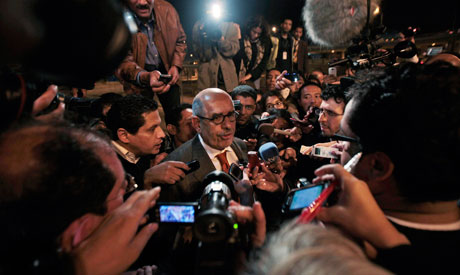
Former Director General of the International Atomic Energy Agency, IAEA, and Nobel Peace Prize winner Mohamed ElBaradei (Photo: AP)
Reform campaigner and onetime presidential frontrunner Mohamed ElBaradei has expressed disappointment at the progress of Egypt's revolution, saying it is now in "intensive care."
ElBaradei, former director general of the International Atomic Energy Agency (IAEA) and a Nobel Peace Prize winner, said that Egypt's next president will not have a constitution to define his duties and that he has little faith in the new charter which is due to be drafted by a constituent assembly.
Both Egypt and its revolution are now in "intensive care," ElBaradei said.
Speaking with anchor Lamis El-Hadidi on 'Hona El-Assema', a programme on Egypt's CBC television channel on Saturday night, ElBaradei said that Egypt's new constitution needs to reflect the 1954 document, which he called the "constitution of the 21st century."
"The constitution is the correct path that should be taken by any state," he said. "The elections have created a parliament that is tame and is incapable of even dismissing a minister.
"The constituent assembly should include all factions of the nation without alienating anyone or saying that they are untrustworthy. I don't really have a lot of hope in the new constitution which will be drafted by the constituent assembly."
ElBaradei added that the Muslim Brotherhood and the Salafist
Nour Party, have made an agreement to remove the word "principles" from the second article of the Egyptian constitution which pertains to Sharia law.
The current constitution already defines the "principles of Islamic law" as the main source of legislation, and such a change would further strengthen the role of Sharia.
"The country is being badly run by the political forces and the military council -- and the victims are the 95 per cent of Egyptians who only want to live," El Baradei said.
"Today the Egyptian revolution is in intensive care. We are now in a sensitive period and we need to find a way to deal with it … there is still hope despite all this worry and frustration."
ElBaradei also expressed displeasure that the Egyptian people had become so divided in the aftermath of last year's uprising.
"We have forgotten our Egyptian identity and every group has its own camp," he complained.
"You’ve got the army camp, the Brotherhood camp and the others -- and they are all betraying one another. For the past year and a half we have been making one mistake after another."
ElBaradei also claimed that no investors wish to put money into Egypt because the country is on the verge of bankruptcy.
He criticised all three authorities in the country -- the executive, judicial and legislative branches -- saying that they are constantly at odds with one another.
ElBaradei also blamed the Islamists for the adoption of Article 28 of the constitutional decree, which stipulated that any decision made by the Supreme Presidential Electoral Commission (SPEC) is irreversible, which sparked anger among revolutionaries.
He also accused the Islamists of using religion for political gains.
Speaking about the presidential elections, ElBaradei said that a new poll would have to be held after the constitution is finally drafted.
But he said that it would have been better if Egypt's presidential candidates had not participated in the elections in the first place and instead insisted the constitution be drafted first.
The fact they are uniting now, El Baradei said, is useless.
ElBaradei himself planned to run in the elections but withdrew before registration began because he believed Egypt's constitution should be drafted first.
He said that if the other presidential candidates had followed suit Egypt would not have been in this situation where an ex-member of the Mubarak regime is now in the second round of the elections.
But ElBaradei shrugged off any suggestion he may run in presidential elections if the Political Disenfranchisement Law, aimed at banning political participation by members of the old regime such as
Ahmed Shafiq, is put into effect.
Instead, ElBaradei said, he would prefer to focus on working with Egypt's youth movements.
Short link: